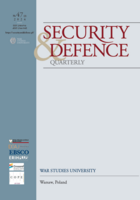The role of military morale as an essential dimension of combat power
The role of military morale as an essential dimension of combat power
Author(s): Mioara CULEA (Șerban)Subject(s): Security and defense, Military policy
Published by: Akademia Sztuki Wojennej
Keywords: security; motivation; morale; combat power;
Summary/Abstract: This paper focuses on the principles and values that guide human behaviour as well as judgements about what is considered ethical. The objectives of this analysis are threefold: (1) to explore the role of morale as an essential dimension of combat power, (2) to identify perceptions and representations related to the importance of military morale in managing stress during wartime or on a field mission, and (3) to identify possible ways to improve the resilience of military personnel deployed on the battlefield within the organisational culture. This study adopts a mixed-methods approach, including qualitative methodologies to examine the role and impact of psychological training and self-confidence in military settings along with quantitative methodologies that include specific questions regarding demographics and military experiences. Semi-structured interviews were conducted with thirty-two military personnel with direct experience in missions, conflict zones, or theatres of operations. Soldiers’ perceptions, formed by their states of necessity and subjective character, contribute to satisfaction, shaping the scope of motivation, and confirming that soldiers’ morale directly influences their actions on the battlefield. Accomplishing a mission requires not only the precise definition of objectives and the provision of the necessary tools but also an appeal to factors that stimulate, raise awareness, and activate personnel. The findings reveal measures that can be taken to manage stress in combat, including subjective ones, deriving from the military’s confidence and conviction in the legitimacy of the cause and the justice of the war, group integration, personal beliefs and hopes as well as objective ones, such as external mass influences, the media or the states involved, which affect the security of the military. The results of the study emphasise the importance of the initial training of the military at individual and group levels, or under leadership of superiors, together with the solidarity of the North Atlantic Treaty Organization and European Union member states in supporting the families of the military and improving their situation from various perspectives: economic, material, orale, civil protection, and child protection.
Journal: Security and Defence Quarterly
- Issue Year: 47/2024
- Issue No: 3
- Page Range: 1-18
- Page Count: 18
- Language: English

